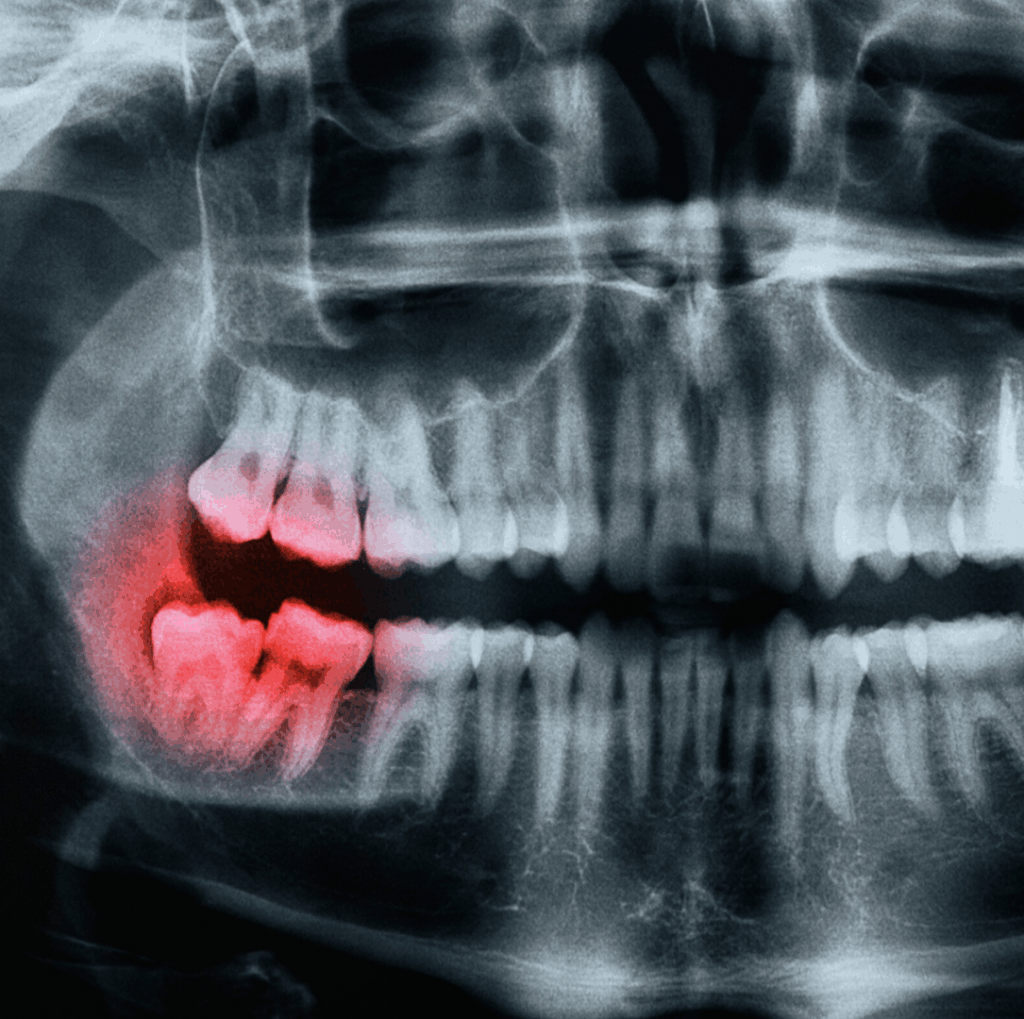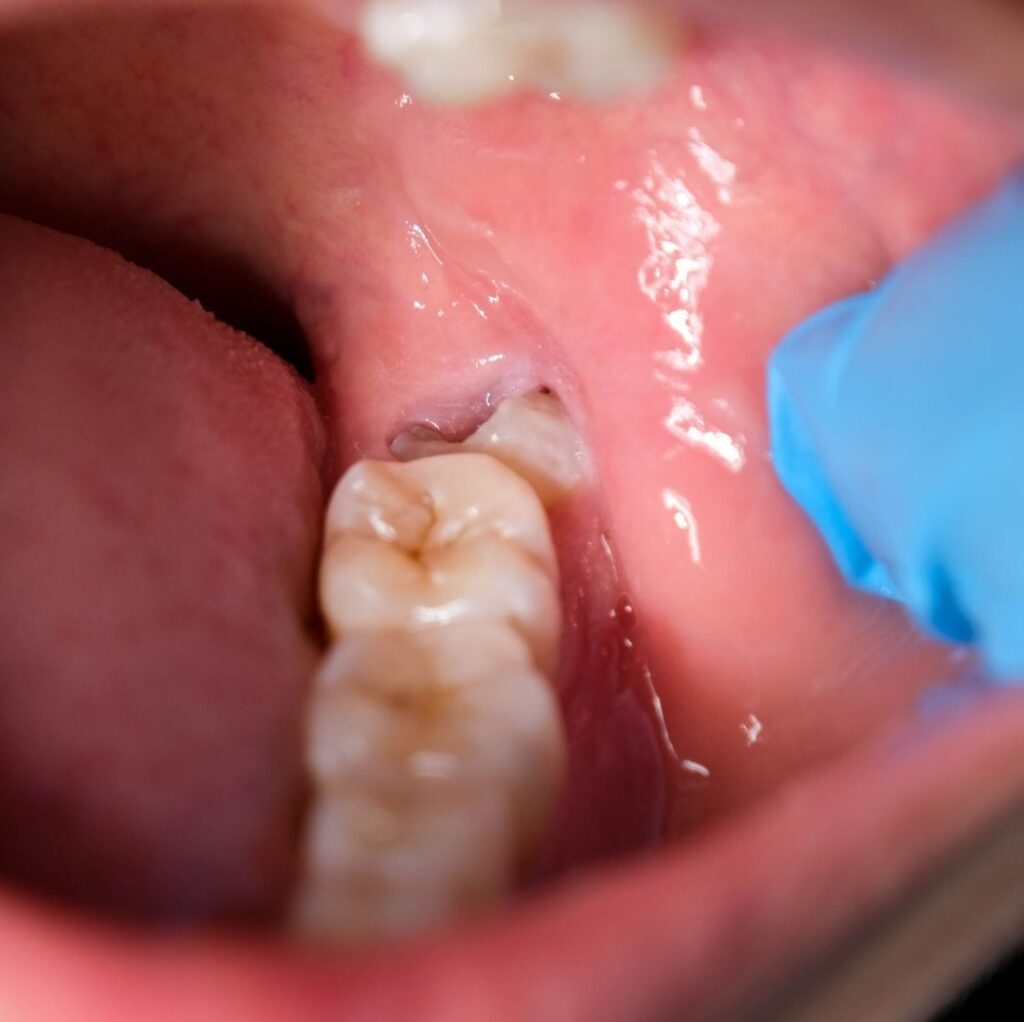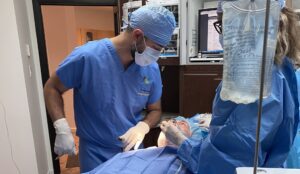Introduction
That nagging sore throat—especially when it only affects one side—might not be from a virus or allergies. For many, the real cause could be wisdom teeth. These third molars can lead to oral health issues that mimic typical throat infections, especially when they’re impacted or infected.
Whether you are experiencing pain related to a wisdom tooth, a sore throat, difficulty swallowing, or swelling near the jaw, it is essential to determine whether the problem is dental in origin.
This post will help you understand:
- How wisdom teeth can cause throat pain
- How to recognize symptoms of a tooth infection
- When to consult a professional
- How to manage a sore throat caused by dental problems
Wisdom Teeth and Your Oral Health
Most people do not have enough space in their mouth or jaw to accommodate these teeth, which often results in impaction. When impacted — meaning they do not emerge completely — they can irritate the surrounding gum tissue, triggering inflammation that can cause a sore throat.
If bacteria enter this area — often due to trapped food particles — it can lead to wisdom tooth infection or even a dental abscess. These infections can spread to surrounding tissues, causing throat pain and sometimes difficulty swallowing.
An infected tooth and a sore throat often go hand in hand when the gum tissue around the tooth becomes inflamed.
Can a Wisdom Tooth Really Cause a Sore Throat?
Yes. It all depends on the anatomy of wisdom teeth, also known as third molars. These teeth are located at the back of the mouth — near the oropharynx, the temporomandibular joint and the lymphatic tissues of the neck and throat. The lower wisdom teeth are even closer to the throat, which increases the risk of spreading infection or inflammation.
Wisdom teeth usually start to emerge between the ages of 17 and 25, which is when most people first experience issues related to their development.
When a wisdom tooth begins to erupt or remains impacted, it can cause localized inflammation. This swelling can spread to nearby tissues, causing pain in the throat, even if it is not infected.
A sore throat can be a sign of wisdom tooth problems. An infected wisdom tooth, particularly in the lower jaw, can trigger the body’s immune response and irritate the surrounding lymph nodes. This inflammation can feel like a one-sided sore throat. The pain may even radiate to the ear, neck or jaw, making diagnosis more difficult.
Recognizing the Difference: Dental Pain vs. Throat Infection
Understanding the origin of your sore throat can save you unnecessary visits and delays in treatment. It’s easy to overlook dental causes of sore throats, as many people may not realize that wisdom teeth and other oral health issues can lead to throat pain.
Typical Cold/Flu/Tonsillitis
- Bilateral throat pain
- Fever, body aches
- Cough, nasal congestion
- Red/swollen tonsils
- White patches on tonsils (tonsillitis)
- Fatigue
 Wisdom Tooth Eruption or Impaction
Wisdom Tooth Eruption or Impaction
- Pain localized at the back of the mouth
- Pressure at the back of the mouth or jaw
- One-sided sore throat, often matching the side of tooth pain
- Gum tenderness or visible swelling behind second molars
- Jaw stiffness or limited mouth opening
- Trouble opening your mouth
- Pain radiating to ear or side of face
- No cold or flu symptoms
 Infected Wisdom Tooth
Infected Wisdom Tooth
- Pus or foul taste
- Swelling around the affected tooth (wisdom tooth)
- Pain when swallowing or opening the mouth
- Unpleasant taste in the mouth
- Difficulty chewing on the affected side
- Fever, fatigue, and general malaise (in moderate/severe cases)
- If infection is left untreated, an abscessed tooth can develop, causing increased pain, swelling, fever, and a sore throat
These distinctions matter. If the sore throat is persistent, on one side, and you notice any tooth discomfort—even if mild—it’s wise to book an evaluation.
When an Infected Tooth Is the Real Culprit
When bacteria accumulate around a partially erupted or impacted wisdom tooth, it can cause pericoronitis. According to the Canadian Dental Association, this is one of the most common complications associated with wisdom teeth.
Common symptoms:
- Red, swollen, or tender gums behind the molars
- White or yellow pus around the tooth
- Bad taste or persistent bad breath
- Swollen lymph nodes under the jaw
- Sore throat, especially on one side
- Headaches
- Pain or difficulty when chewing
- In severe cases: difficulty swallowing or breathing
Inflammation can also irritate the tonsils and cause swelling on one side, sometimes mistaken for a viral infection such as strep throat or mononucleosis.
Other Dental Issues That Might Cause Throat Pain
- Tooth abscesses in molars or premolars can track infection through soft tissues, causing swelling near the throat.
- Gum disease (periodontitis), when advanced, can irritate tissues beyond the mouth.
- Untreated cavities in lower molars can occasionally radiate discomfort to the jaw and throat.
- Sinusitis caused by dental problems can cause sore throats and headaches.
Throat pain can also result from irritated nerves in the jaw, which can affect the ear and neck.
What to Do If You Suspect Your Sore Throat Is from a Wisdom Tooth
Consult us (except in emergencies)
If you have a one-sided sore throat accompanied by discomfort or swelling at the back of your mouth, book an appointment as soon as possible. A panoramic X-ray (OPG) or 3D scan (CBCT) can confirm the presence of an impacted tooth or an infection.
See a doctor if:
- You have systemic symptoms (high fever, chills, trouble breathing)
- Pain persists despite dental treatment
- You have visible tonsil infection or rash (suggesting viral illness)
Self-assessment tips:
- Use a flashlight to check for swelling or redness behind your molars.
- Gently press on the jaw hinge (under the ear); pain may signal impaction.
- Tap your teeth: increased sensitivity or pain could suggest infection.
How to Treat a Sore Throat Caused by Wisdom Teeth?
At-Home Relief:
- Warm saltwater rinses (½ tsp (2.5 mL) of salt in 1 cup (250 mL) of warm water, 2–3 times/day)
- Cold compresses on the cheek to reduce swelling
- Anti-inflammatories like ibuprofen or acetaminophen (as directed)
- Stay hydrated by drinking plenty of fluids
Professional Treatment:
- Cleaning under the gum flap covering the erupting tooth
- Prescription antibiotics for infection
- Surgical extraction, if the wisdom tooth is infected or impacted
Do not attempt to pop or drain anything yourself. This can worsen the infection or spread bacteria into deeper tissues.
After Extraction
Post-operative sore throat is common, especially after lower wisdom tooth extraction.
Expect:
- Sore throat for 2 to 4 days
- Stiff jaw and difficulty swallowing
- Follow the post-operative instructions: soft foods, no smoking, gentle rinsing, etc.

Conclusion
A sore throat does not always mean you are ill. If it is localized on one side and accompanied by jaw pain or swollen gums, a wisdom tooth may be the cause.
Do not wait. A quick diagnosis prevents complications. Consult us as soon as symptoms appear.
Introduction
That nagging sore throat—especially when it only affects one side—might not be from a virus or allergies. For many, the real cause could be wisdom teeth. These third molars can lead to oral health issues that mimic typical throat infections, especially when they’re impacted or infected.
Whether you are experiencing pain related to a wisdom tooth, a sore throat, difficulty swallowing, or swelling near the jaw, it is essential to determine whether the problem is dental in origin.
This post will help you understand:
- How wisdom teeth can cause throat pain
- How to recognize symptoms of a tooth infection
- When to consult a professional
- How to manage a sore throat caused by dental problems
Wisdom Teeth and Your Oral Health
Most people do not have enough space in their mouth or jaw to accommodate these teeth, which often results in impaction. When impacted — meaning they do not emerge completely — they can irritate the surrounding gum tissue, triggering inflammation that can cause a sore throat.
If bacteria enter this area — often due to trapped food particles — it can lead to wisdom tooth infection or even a dental abscess. These infections can spread to surrounding tissues, causing throat pain and sometimes difficulty swallowing.
An infected tooth and a sore throat often go hand in hand when the gum tissue around the tooth becomes inflamed.
Can a Wisdom Tooth Really Cause a Sore Throat?
Yes. It all depends on the anatomy of wisdom teeth, also known as third molars. These teeth are located at the back of the mouth — near the oropharynx, the temporomandibular joint and the lymphatic tissues of the neck and throat. The lower wisdom teeth are even closer to the throat, which increases the risk of spreading infection or inflammation.
Wisdom teeth usually start to emerge between the ages of 17 and 25, which is when most people first experience issues related to their development.
When a wisdom tooth begins to erupt or remains impacted, it can cause localized inflammation. This swelling can spread to nearby tissues, causing pain in the throat, even if it is not infected.
A sore throat can be a sign of wisdom tooth problems. An infected wisdom tooth, particularly in the lower jaw, can trigger the body’s immune response and irritate the surrounding lymph nodes. This inflammation can feel like a one-sided sore throat. The pain may even radiate to the ear, neck or jaw, making diagnosis more difficult.
Recognizing the Difference: Dental Pain vs. Throat Infection
Understanding the origin of your sore throat can save you unnecessary visits and delays in treatment. It’s easy to overlook dental causes of sore throats, as many people may not realize that wisdom teeth and other oral health issues can lead to throat pain.
Typical Cold/Flu/Tonsillitis
- Bilateral throat pain
- Fever, body aches
- Cough, nasal congestion
- Red/swollen tonsils
- White patches on tonsils (tonsillitis)
- Fatigue
 Wisdom Tooth Eruption or Impaction
Wisdom Tooth Eruption or Impaction
- Pain localized at the back of the mouth
- Pressure at the back of the mouth or jaw
- One-sided sore throat, often matching the side of tooth pain
- Gum tenderness or visible swelling behind second molars
- Jaw stiffness or limited mouth opening
- Trouble opening your mouth
- Pain radiating to ear or side of face
- No cold or flu symptoms
 Infected Wisdom Tooth
Infected Wisdom Tooth
- Pus or foul taste
- Swelling around the affected tooth (wisdom tooth)
- Pain when swallowing or opening the mouth
- Unpleasant taste in the mouth
- Difficulty chewing on the affected side
- Fever, fatigue, and general malaise (in moderate/severe cases)
- If infection is left untreated, an abscessed tooth can develop, causing increased pain, swelling, fever, and a sore throat
These distinctions matter. If the sore throat is persistent, on one side, and you notice any tooth discomfort—even if mild—it’s wise to book an evaluation.
When an Infected Tooth Is the Real Culprit
When bacteria accumulate around a partially erupted or impacted wisdom tooth, it can cause pericoronitis. According to the Canadian Dental Association, this is one of the most common complications associated with wisdom teeth.
Common symptoms:
- Red, swollen, or tender gums behind the molars
- White or yellow pus around the tooth
- Bad taste or persistent bad breath
- Swollen lymph nodes under the jaw
- Sore throat, especially on one side
- Headaches
- Pain or difficulty when chewing
- In severe cases: difficulty swallowing or breathing
Inflammation can also irritate the tonsils and cause swelling on one side, sometimes mistaken for a viral infection such as strep throat or mononucleosis.
Other Dental Issues That Might Cause Throat Pain
- Tooth abscesses in molars or premolars can track infection through soft tissues, causing swelling near the throat.
- Gum disease (periodontitis), when advanced, can irritate tissues beyond the mouth.
- Untreated cavities in lower molars can occasionally radiate discomfort to the jaw and throat.
- Sinusitis caused by dental problems can cause sore throats and headaches.
Throat pain can also result from irritated nerves in the jaw, which can affect the ear and neck.
What to Do If You Suspect Your Sore Throat Is from a Wisdom Tooth
Consult us (except in emergencies)
If you have a one-sided sore throat accompanied by discomfort or swelling at the back of your mouth, book an appointment as soon as possible. A panoramic X-ray (OPG) or 3D scan (CBCT) can confirm the presence of an impacted tooth or an infection.
See a doctor if:
- You have systemic symptoms (high fever, chills, trouble breathing)
- Pain persists despite dental treatment
- You have visible tonsil infection or rash (suggesting viral illness)
Self-assessment tips:
- Use a flashlight to check for swelling or redness behind your molars.
- Gently press on the jaw hinge (under the ear); pain may signal impaction.
- Tap your teeth: increased sensitivity or pain could suggest infection.
How to Treat a Sore Throat Caused by Wisdom Teeth?
At-Home Relief:
- Warm saltwater rinses (½ tsp (2.5 mL) of salt in 1 cup (250 mL) of warm water, 2–3 times/day)
- Cold compresses on the cheek to reduce swelling
- Anti-inflammatories like ibuprofen or acetaminophen (as directed)
- Stay hydrated by drinking plenty of fluids
Professional Treatment:
- Cleaning under the gum flap covering the erupting tooth
- Prescription antibiotics for infection
- Surgical extraction, if the wisdom tooth is infected or impacted
Do not attempt to pop or drain anything yourself. This can worsen the infection or spread bacteria into deeper tissues.
After Extraction
Post-operative sore throat is common, especially after lower wisdom tooth extraction.
Expect:
- Sore throat for 2 to 4 days
- Stiff jaw and difficulty swallowing
- Follow the post-operative instructions: soft foods, no smoking, gentle rinsing, etc.

Conclusion
A sore throat does not always mean you are ill. If it is localized on one side and accompanied by jaw pain or swollen gums, a wisdom tooth may be the cause.
Do not wait. A quick diagnosis prevents complications. Consult us as soon as symptoms appear.










